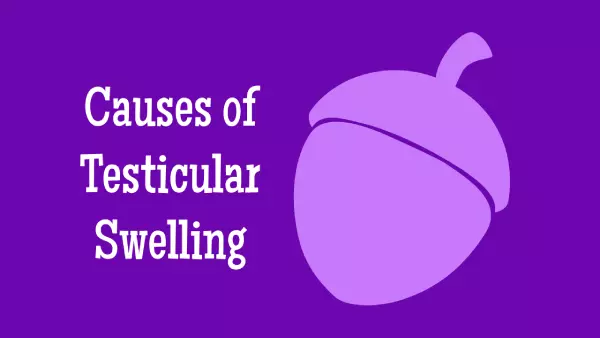Swelling in any part of the body is not a pleasant experience. But when it comes to the male reproductive system, it can be particularly concerning. Testicular swelling, or an enlargement in one or both testicles, can be caused by a variety of factors.
In this blog post, we will discuss the common causes of testicular swelling in men and what you need to know about them. Understanding these causes can help you recognize if you are experiencing any symptoms and seek timely medical attention if needed.
Injury or Trauma Leading to Testicular Swelling
Injury or trauma to the testicles is a common cause of testicular swelling in males. This can be from accidents such as car or bike collisions or gunshot wounds. The first sign of trauma to the testicles is usually severe pain, but it can also be due to infection or swelling. Contusion, which involves bleeding, swelling and bruising, can occur when an accident injures blood vessels in the testicles. Urethral injuries, epididymitis and hematomas are other diagnoses of concern caused by testicular trauma. If the pain is severe or acute, medical attention should be sought immediately to ensure prompt treatment.
Inflammation of the Testicles
Inflammation of the testicles, also known as orchitis, can be caused by a bacterial or viral infection, and can lead to swelling and pain. This condition can be accompanied by other symptoms, such as fever, nausea, and vomiting. Orchitis can also be a complication of other infections, such as mumps, and can lead to infertility if left untreated. In addition to orchitis, other causes of testicular swelling in males can include injury or trauma, fluid accumulation in the scrotum, and congenital defects. It is important to seek medical attention if experiencing any swelling or pain in the testicles, as it can be a sign of a more serious underlying condition.
Testicular Torsion
Testicular torsion is a serious medical emergency that can lead to the death of the testicle if not treated promptly. It occurs when the spermatic cord twists and cuts off the blood supply to the testicle. This can cause sudden and severe pain, swelling, and redness of the scrotum.
Fluid Accumulation in the Scrotum (Hydrocele)
Hydrocele is considered as one of the common causes of testicular swelling in males. It occurs when there is a buildup of fluid in the scrotum’s protective sac, leading to swelling and discomfort. Although hydroceles can happen in boys and men of all ages, they are more common in newborns and older men. In some cases, hydrocele can be caused by an injury or trauma to the testicles. It can also be a congenital defect or a result of inflammation or infection in the testicles.
Hydrocele shares similar symptoms with other causes of testicular swelling, such as pain, discomfort, and a feeling of heaviness in the scrotum. Depending on the severity, hydrocele can cause the scrotum to appear larger than normal. Fortunately, hydrocele is usually not a cause for concern and can resolve on its own within a few months. However, if it persists or causes significant discomfort, medical intervention may be necessary.
It is important for individuals to seek medical attention if they experience persistent testicular swelling or any other abnormal symptoms in the scrotum. If left untreated, hydrocele and other causes of testicular swelling can lead to complications such as infections, infertility, and testicular torsion, which is a medical emergency that requires immediate surgical intervention.
Congenital Defects
Congenital defects can also lead to testicular swelling in males. These defects are present from birth and result from abnormalities in fetal development. The most common congenital defect that causes testicular swelling is cryptorchidism, where one or both testicles fail to descend from the abdomen into the scrotum. Another defect is called inguinal hernia, where the intestine protrudes through a weak spot in the abdominal muscles, causing a lump in the scrotum. These defects can result in discomfort and swelling in the testicles. It is important to seek medical attention if you suspect a congenital defect may be causing testicular swelling.
Treatment options vary depending on the specific defect but can include surgery to correct the abnormality.
Epididymis in Testicular Swelling
Epididymis inflammation is a common cause of testicular swelling. This condition, known as epididymitis, occurs when bacteria, including sexually transmitted infections such as chlamydia or gonorrhea, infect the epididymis tube located at the back of the testicle. In some cases, this swelling may be accompanied by intense pain.
Testicular Swelling and Prostate Congestion
Testicular swelling can also be caused by congestion or severe enlargement of the prostate gland, which is a member of the male reproductive system located below the bladder. This congestion can result in pain in the testicle and lower back, especially when accompanied by inflammation of the prostate.
Symptoms of prostate congestion include dysuria, blood in the semen when ejaculating, and a decrease in sexual desire. Treatment for this condition includes avoidance of sexual arousal, which causes fluid formation. In addition, medications and relaxation techniques can be used to alleviate symptoms.
It is important to seek medical attention if testicular pain persists, as it may be an indication of an infection or other underlying condition.
When to Seek Medical Attention
When experiencing testicular swelling, it is important to seek medical attention immediately. Delaying medical care can lead to serious health consequences. Some causes of testicular swelling, such as injury or trauma, can be accompanied by intense pain and discomfort.
Inflammation of the testicles or orchitis can also cause pain, fever, and general malaise.
Testicular torsion, a twisting of the testicles caused by trauma or injury, can lead to sudden and intense pain. If not treated immediately, it can result in permanent damage to the testicles or even infertility.
Hydrocele and congenital defects can also cause swelling and discomfort. The presence of the epididymis can also be responsible for testicular swelling.
Prostate congestion can also cause testicular swelling. In any case, it is important to seek medical attention as soon as possible to determine the underlying cause and receive appropriate treatment.
About the Author
Reyus Mammadli is the author of this health blog since 2008. With a background in medical and biotechnical devices, he has over 15 years of experience working with medical literature and expert guidelines from WHO, CDC, Mayo Clinic, and others. His goal is to present clear, accurate health information for everyday readers — not as a substitute for medical advice.







